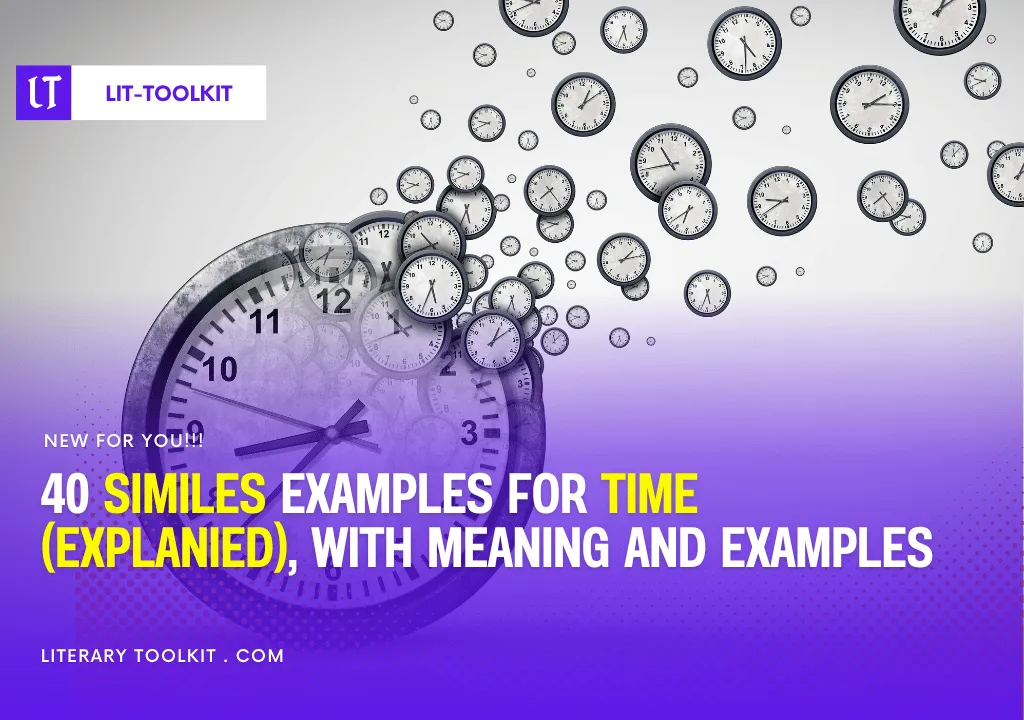Time is a fundamental dimension, a component of the universe’s fabric, which humans perceive sequentially. Research, such as studies on circadian rhythms, indicates biological clocks influence our perception of time’s passage, often making it feel variable; for instance, a 2019 study in Nature Human Behaviour by T.P. Spapé et al. demonstrated how physiological arousal can alter temporal judgments.
I presents 40 distinct similes for time, offering varied lenses through which to comprehend its elusive nature. The structured comparisons aim to provide clear, relatable imagery, enhancing understanding for readers and providing semantically rich content for search engine interpretation.
Short Similes for Time
These concise similes offer impactful comparisons for the concept of time with brevity.
Time is like a silent footfall.
Meaning: Time passes quietly and often unnoticed until a significant moment has passed.
Example: The years accumulated, and time was like a silent footfall; suddenly, decades had gone by.
Time is like a melting icicle.
Meaning: Time diminishes steadily and irreversibly.
Example: With each passing day, our opportunity felt as though time was like a melting icicle, dripping away.
Time is like a drawn curtain.
Meaning: The future is obscured, and the past is revealed gradually, or a phase ends.
Example: For the project’s next stage, time is like a drawn curtain, revealing what comes next only when it arrives.
Time is like a single breath.
Meaning: A moment or lifespan can feel very short and precious.
Example: Her childhood seemed as though time was like a single breath, exhaled too quickly.
Extended Similes for Time
These similes use more developed imagery to provide a deeper, more nuanced understanding of time’s nature.
Time is like a meticulous weaver, its threads unseen but its patterns emerging with each passing era.
Meaning: Time gradually creates complex histories and outcomes from countless individual moments and actions, the full design only visible in retrospect.
Example: The rise and fall of civilizations demonstrate how time is like a meticulous weaver, its threads unseen but its patterns emerging with each passing era, showing interconnected events shaping history.
Time is like an old gardener, pruning some possibilities while allowing others to flourish into unexpected blooms.
Meaning: Time eliminates certain opportunities or paths while nurturing others, leading to unforeseen developments or growth.
Example: His career trajectory showed that time is like an old gardener; early setbacks closed some doors, but new skills blossomed, leading him to a fulfilling, unplanned profession.
Time is like a vast, uncharted ocean, where moments are islands, some visited briefly, others becoming permanent fixtures in memory’s archipelago.
Meaning: Time is immense and largely unknown ahead, with specific experiences standing out as significant points in our personal history.
Example: Looking back at her life, she felt time is like a vast, uncharted ocean, with her wedding day and the birth of her child being cherished islands in memory’s archipelago.
Time is like a cryptic manuscript, with each day a new page that scholars (historians and individuals alike) try to decipher for meaning.
Meaning: The passage of time presents events and experiences that require interpretation to understand their significance and lessons.
Example: Understanding the present economic climate requires us to see that time is like a cryptic manuscript; we analyze past trends to make sense of current events.
Similes for Time in Literature
Literary traditions often employ distinctive similes to explore time’s profound impact on human experience, drawing from narrative and poetic conventions. These similes reflect established literary devices.
In many epics, time is like a relentless chariot, carrying heroes towards their fated destinies, its wheels grinding forward irrespective of their desires.
Meaning: Time is an unstoppable force in narrative, often depicted as driving characters towards inevitable outcomes. This is a common trope in classical literature, as noted by scholars like Northrop Frye in “Anatomy of Criticism,” where archetypal patterns dictate narrative progression.
Example: The hero’s journey in the ancient poem showed how time is like a relentless chariot, moving him steadily towards the prophecy’s fulfillment.
Modernist authors often present time like a fractured mirror, reflecting moments in a non-linear, subjective sequence, mirroring the workings of memory.
Meaning: Time is not always perceived or portrayed as a straight line but as fragmented and influenced by individual consciousness. Virginia Woolf’s “Mrs Dalloway” is a prime example of this narrative technique, where the characters’ thoughts and memories disrupt chronological flow.
Example: The novel’s structure, where flashbacks interrupted the present, demonstrated how time is like a fractured mirror, showing the protagonist’s disjointed recollections.
In pastoral poetry, time is often like a gently flowing stream, its pace unhurried, allowing for reflection amidst nature’s cycles.
Meaning: Time can be depicted as moving slowly and peacefully, harmonizing with the natural world. This representation is explored in works like William Wordsworth’s “Tintern Abbey,” where nature and time foster contemplation.
Example: The poem described the shepherd’s tranquil life, where time is like a gently flowing stream, marked by seasons rather than minutes.
For the existentialist writer, time is like an ever-present weight, compelling choices within a finite span, thereby defining human freedom and responsibility.
Meaning: Time’s limited nature creates the urgency and significance of human decisions. Jean-Paul Sartre’s discussions of temporality in “Being and Nothingness” emphasize how future possibilities and past facticity shape present choices.
Example: The character’s constant awareness of his mortality made time seem like an ever-present weight, forcing him to confront the meaning of his actions.
Similes for Time
This broader selection continues to offer diverse and distinct comparisons for time.
Time is like a steadfast lighthouse beam.
Meaning: Time passes regularly and predictably, marking moments or eras consistently.
Example: Through all the societal changes, the annual festival continued, so for the community, time was like a steadfast lighthouse beam, a constant in their lives.
Time is like an unseen sculptor.
Meaning: Time gradually shapes and changes things, often imperceptibly.
Example: The erosion on the ancient monument showed that time is like an unseen sculptor, slowly altering its form.
Time is like a fading echo.
Meaning: The impact or memory of past events diminishes over time.
Example: Years after the event, the initial shock subsided, proving time is like a fading echo.
Time is like a silent accountant.
Meaning: Time keeps a record of all things, eventually balancing accounts or revealing truths.
Example: Though the deception lasted years, eventually, the facts emerged; time is like a silent accountant.
Time is like a growing seed.
Meaning: Potential and consequences develop over time from small beginnings.
Example: The small investment grew substantially over decades; time is like a growing seed.
Time is like a restless nomad.
Meaning: Time is constantly moving, never settling in one place or moment.
Example: We can never hold onto a moment; time is like a restless nomad, always journeying forward.
Time is like a shrinking map.
Meaning: As one ages or as a deadline approaches, the perceived amount of available time lessens.
Example: With only a week left, the period for completion made time seem like a shrinking map.
Time is like a closing door.
Meaning: Opportunities can be finite and disappear if not seized.
Example: He regretted not applying sooner; for that job, time was like a closing door.
Time is like an unraveling scroll.
Meaning: The future unfolds continuously, revealing what was previously unknown.
Example: Each new discovery about the ancient civilization showed that time is like an unraveling scroll.
Time is like a fickle friend.
Meaning: Time can seem to pass quickly when desired slowly, and slowly when desired quickly.
Example: During the exciting vacation, time was like a fickle friend, rushing by, but during the dull meeting, it dragged.
Time is like a patient predator.
Meaning: Time inevitably catches up with everyone and everything.
Example: Despite his efforts to stay young, wrinkles appeared; time is like a patient predator.
Time is like a shifting dune.
Meaning: The conditions and landscapes of life are constantly changing with time.
Example: Looking at old photographs of the city, it was clear that time is like a shifting dune, altering everything.
Time is like a hidden current.
Meaning: Time moves events and lives along, often in ways not immediately apparent.
Example: Unseen societal forces were at play, showing that time is like a hidden current, guiding the nation’s trajectory.
Time is like a double-edged blade.
Meaning: Time can heal, but it can also cause pain through loss or decay.
Example: While his grief softened, his youth also faded; time is like a double-edged blade.
Time is like a borrowed treasure.
Meaning: Time is valuable and not permanently ours to keep.
Example: She cherished every moment with her grandparents, knowing that time is like a borrowed treasure.
Time is like a relentless tide.
Meaning: Time advances steadily and cannot be stopped or reversed.
Example: The deadline approached with unwavering certainty; time is like a relentless tide.
Time is like a blank canvas.
Meaning: The future offers opportunities to create and define one’s life.
Example: With the new year beginning, he felt that time is like a blank canvas, ready for his ambitions.
Time is like a stern schoolmaster.
Meaning: Time teaches lessons, often through difficult experiences.
Example: After many failures, he finally learned perseverance; time is like a stern schoolmaster.
Time is like a fleeting fragrance.
Meaning: Moments, especially joyful ones, can be brief and elusive.
Example: The perfect summer evening was beautiful but short; time is like a fleeting fragrance.
Time is like a shadowed pathway.
Meaning: The future is uncertain and not clearly visible.
Example: We make plans, but ultimately, time is like a shadowed pathway, and we cannot see far ahead.
Time is like a turning page.
Meaning: Life moves from one phase or event to the next.
Example: After graduation, she felt that time is like a turning page, bringing a new chapter.
Time is like a fixed currency.
Meaning: Everyone has a limited amount of time, which must be spent wisely.
Example: He managed his schedule carefully because, for his goals, time is like a fixed currency.
Time is like a mountain range.
Meaning: Life has its peaks (high points) and valleys (low points) that unfold over time.
Example: Reflecting on his long career, he saw that time is like a mountain range, with triumphs and challenges.
Time is like a coded message.
Meaning: The meaning of past events or the direction of the future often requires careful interpretation over time.
Example: Historians analyze past events, knowing that time is like a coded message, holding clues to the present.
Time is like a quiet river.
Meaning: Time flows steadily and continuously, often without dramatic notice but with constant progression.
Example: Decades passed in their peaceful village, and time was like a quiet river, moving ever onward.
Time is like a precise clockwork.
Meaning: Time operates with regularity and measurable consistency, governing natural cycles and human schedules.
Example: The changing of seasons demonstrates that, on a grand scale, time is like a precise clockwork.
Time is like a worn pathway.
Meaning: The passage of time marks and changes individuals and objects, showing evidence of the journey taken.
Example: The lines on her face told a story; for a long life, time is like a worn pathway.
Time is like a swift arrow.
Meaning: Time moves quickly and directly towards its mark or end.
Example: His youth passed in a flash, demonstrating that time is like a swift arrow, quickly reaching its target.

